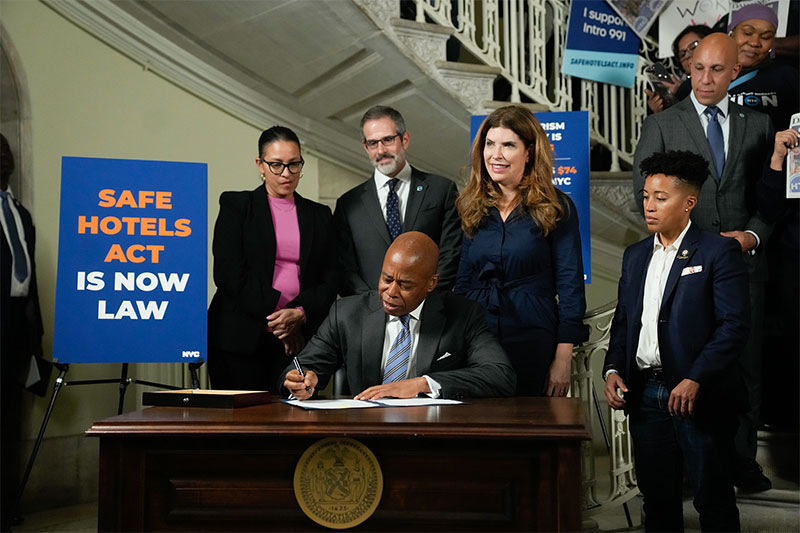NEWYORK: New York city Mayor Eric Adams signed legislation to create safer hotels for employees and visitors alike and bolster the city’s tourism industry.
Intro. 0991 will set new, stronger standards around safety, staffing, and cleaning in the city’s hotels, as well as licensing requirements to help enforce worker and guest protections.
The legislation builds on the tourism industry’s economic resurgence under the Adams administration, with New York city estimated to see 64.5 million visitors in 2024 and the highest tourism levels in the city’s history in 2025.
“Our top priority from day one has been to keep people safe, and that includes protecting workers and tourists at our city’s hotels. That’s why we are expanding protections for the working-class New Yorkers who run our hotels and the guests who use them,” said Mayor Adams.
“The Safe Hotels Act ensures that our hotels are safe, healthy, and clean, and that our tourism industry can thrive and create jobs across the city. This is a win for working people, the tourism and hotel industry, and all New Yorkers and guests.”
“Since we came into office, we’ve been laser focused on supporting the recovery of our $74 billion tourism economy,” said First Deputy Mayor Maria Torres-Springer.
“That includes attracting visitors from around the globe back to the five boroughs and supporting the hotel and hospitality industries that make New York City the best city in the world. The Safe Hotels Act will help us ensure the safety of our 62 million tourists as well as our city hotel workers. In partnership with the hotel industry, we are committed to creating a streamlined application process for qualified hotel license applicants so that the operations of this critical industry are not disrupted.”
“The hotel industry has always been vital to the success of New York City, providing tens of thousands of workers with stable employment and consumers with places to stay while they enjoy our city,” said New York City Department of Consumer and Worker Protection Commissioner Vilda Vera Mayuga.
“We are committed to creating a culture of compliance with our city’s laws and protecting New Yorkers and tourists in the marketplace.”
Intro. 0991 — sponsored by New York City Councilmember Julie Menin — takes several steps to keep New York City hotels safe, healthy, and clean. Hotels must receive a license from the city and ensure that staff — including front desk staff at all hotels and security guards at large hotels — are on-site whenever a guest is staying at the hotel.
The legislation also requires hotel operators to train employees on recognizing human trafficking and equip employees with panic buttons. Finally, it requires hotels to clean guest rooms every day unless a visitor declines the service.
The legislation builds on the tourism industry’s powerful resurgence under the Adams administration, with tourism estimated to break record levels by next year. Last year, the tourism industry generated $74 billion in economic impact for New York City, with more than $48 billion coming from direct spending, supporting over 380,000 leisure and hospitality jobs — roughly 9 percent of the city’s workforce — and thousands of small and minority-owned businesses.
The legislation comes as New York City and New Jersey prepare to host the FIFA World Cup 26 final and seven other matches throughout the tournament at New York New Jersey Stadium (MetLife Stadium) in East Rutherford, New Jersey in 2026, with more than 1 million tourists anticipated to come to the region for the tournament.
FIFA World Cup 26™ matches played at New York New Jersey Stadium (MetLife Stadium), including the final, are projected to generate over $2 billion in economic impact alone for the New York City/New Jersey region and are anticipated to support over 14,000 jobs.
Intro. 0991 also builds on recent achievements in reducing crime across New York City. The New York City Police Department recently announced the ninth straight month of declines in overall crime in the five boroughs , with a 3.1 percent drop in major offenses compared to the same month last year.
“The Safe Hotels Act marks a historic step towards enhancing public safety and ensuring worker protection in the city’s hotel and hospitality industry,” said New York City Councilmember Julie Menin.
“This landmark legislation requires hotels to obtain a license to operate in New York’s five boroughs, implements crucial safety measures such as panic buttons for housekeepers, human trafficking recognition training, and subcontracting restrictions for critical, public-facing hotel staff. I am profoundly grateful for the overwhelming support the Safe Hotels Act has received from across New York City including the incredible support of the Hotel Trades Council, the five district attorneys, Attorney General Letitia James, a broad labor coalition including HTC, 32BJ, DC37, the Central Labor Council, NYSNA, CWA, PBA as well as a bipartisan supermajority of New York City Councilmembers, human trafficking survivors, and advocacy groups. By signing the Safe Hotels Act into law, New York City joins other major cities in prioritizing the safety and well-being of hotel guests, workers, and surrounding communities.”
“Ensuring the safety and dignity of hotel workers is essential in a city that thrives on hospitality and tourism,” said New York City Councilmember Shaun Abreu.
“This hotel safety bill is a vital step toward protecting both patrons and those who keep our hotels running smoothly and safely every day. By prioritizing the well-being of these workers, we send a clear message that New York City values the people behind our industry’s success. I’m proud to stand with HTC and our hotel workers in supporting this essential legislation.”
“With tens of millions of visitors annually, New York City has a duty to keep consumers and workers safe,” said New York City Councilmember Carmen De La Rosa, chair, Committee on Civil Service and Labor.
“Our hotels have been grounds for workplace harassment, health and hygiene concerns, and trafficking. The Safe Hotels Act brings a key component of the hospitality industry within a tourist hotspot into a licensing and regulatory framework that our visitors and workers desperately need for additional safety and oversight. Today, New York City takes another step forward in the right direction by signing this bill into law.”
“The Safe Hotels Act will not only protect hotel guests and workers but ensure high quality hotel operations that will cement New York City’s status as a world-class hospitality destination,” said Rich Maroko, president, Hotel and Gaming Trades Council.
“We thank Mayor Eric Adams for signing this critical legislation into law and prioritizing the well-being of the regular people who run New York’s tourism economy. We also thank Speaker Adrienne Adams and Councilmember Julie Menin for their incredible leadership in getting this bill passed by such a strong margin in the City Council.”



